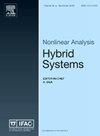State estimation of the semilinear wave equation over the limited capacity communication channel
Abstract
In the paper the problem of state estimation of the nonlinear spatially-distributed system described by semilinear wave equations over the limited capacity communication channel is considered under the assumption that the boundary derivative is measured with the sampling and the external boundary control input is perfectly known. The Luenberger-type observer is designed based on the Speed-gradient method with an energy-like objective functional. An upper bound for the observer error in terms of the data transmission error and channel data rate (capacity) is derived and two data transmission procedures are numerically studied to find the admissible data transmission bounds. The key contribution of this paper is the extension of the previously existing results to the cases when the measurements and signal transmission in the control system cannot be available instantly and the finite capacity of the communication channels should be taken into account. The study of such cases is important for the observation and control of PDEs since the instant processing of infinite dimensional PDE data is problematic. The novelty of the results is threefold. Firstly, the state observer for distributed systems described by semilinear wave equations under limited channel data rate (capacity) is designed. Secondly, first time analytic bound for estimation error is obtained. Thirdly, first time the adaptive coding procedure is introduced and numerically studied for distributed systems.

 求助内容:
求助内容: 应助结果提醒方式:
应助结果提醒方式:


